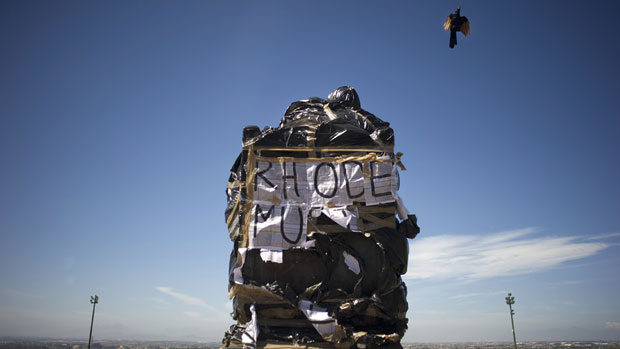Why students in Cape Town are fighting to topple a statue
A sculpture of British imperialist Cecil Rhodes has come to symbolise 'institutional racism', activists say

A free daily email with the biggest news stories of the day – and the best features from TheWeek.com
You are now subscribed
Your newsletter sign-up was successful
A statue of British colonialist Cecil Rhodes on the steps of the University of Cape Town has been boarded up after weeks of demonstrations.
Campaigners are protesting against Rhodes' imperialist legacy, as well as what they call "institutional racism" on campus at Africa's leading university.
They argue that bringing down the statue would mark the beginning of deeper structural changes that need to happen at the university, such moving away from a Eurocentric curriculum and addressing the lack of black academics.
The Week
Escape your echo chamber. Get the facts behind the news, plus analysis from multiple perspectives.

Sign up for The Week's Free Newsletters
From our morning news briefing to a weekly Good News Newsletter, get the best of The Week delivered directly to your inbox.
From our morning news briefing to a weekly Good News Newsletter, get the best of The Week delivered directly to your inbox.
The campaign began as a "poo protest", when a student threw a bucket of excrement at the statue, triggering a conversation about race, identity and the country's colonial legacy, the Guardian reports.
"There is underlying anger in the country," said Xolela Mangcu, an academic at the university. "There has been a failure to really engage truthfully with the raw emotions of people's experience. A thing like the Rhodes statue triggers the raw feelings of alienation."
While activist argue that there is no place for the statue of an imperialist leader in post-apartheid South Africa, the university’s vice-chancellor Max Price has said that there is value in examining why Rhodes came to be viewed as an important historical and political figure.
"He achieved an enormous amount by the time he died," Price said. He was "a businessman, diplomat and prime minister of the Cape, a military strategist and a philanthropist very committed to education, and in all these things he was successful."
A free daily email with the biggest news stories of the day – and the best features from TheWeek.com
Campaigners argue that such a viewpoint is "indefensible", saying that Rhodes was responsible for the genocide of tens of thousands of people across Southern Africa, and laying the foundations for the apartheid state.
"He dispossessed black people of their ancestral lands in modern-day Zimbabwe and Zambia through armed conquest in one of the most ignominious 'land grabs' in modern history," writes Adekeye Adebajo in the South African Sunday Independent.
Although the criticism of Rhodes is legitimate, "every historical figure can be contested", argues Verashni Pillay in the Johannesburg-based Mail and Guardian. "We could argue to take down South African statues of Mahatma Gandhi, who wasn't exactly the best friend to this country's black majority. When do we stop?"
But there may be a more powerful way to deal with the statue than simply removing it, suggests Business Day columnist Chris Thurman. "Instead of approaching the statue as a static monument with a fixed meaning that must either be endorsed or condemned, why not commission an artist or group of artists to propose a creative response?"
He suggests the statue could be modified or incorporated into a larger piece of work, "making it part of a continuing dialogue rather than a monumental monologue".
A final decision on the statue will be made on April 8, when the university's council votes on the matter.
-
 5 calamitous cartoons about the Washington Post layoffs
5 calamitous cartoons about the Washington Post layoffsCartoons Artists take on a new chapter in journalism, democracy in darkness, and more
-
 Political cartoons for February 14
Political cartoons for February 14Cartoons Saturday's political cartoons include a Valentine's grift, Hillary on the hook, and more
-
 Tourangelle-style pork with prunes recipe
Tourangelle-style pork with prunes recipeThe Week Recommends This traditional, rustic dish is a French classic
-
 Epstein files topple law CEO, roil UK government
Epstein files topple law CEO, roil UK governmentSpeed Read Peter Mandelson, Britain’s former ambassador to the US, is caught up in the scandal
-
 Iran and US prepare to meet after skirmishes
Iran and US prepare to meet after skirmishesSpeed Read The incident comes amid heightened tensions in the Middle East
-
 Israel retrieves final hostage’s body from Gaza
Israel retrieves final hostage’s body from GazaSpeed Read The 24-year-old police officer was killed during the initial Hamas attack
-
 China’s Xi targets top general in growing purge
China’s Xi targets top general in growing purgeSpeed Read Zhang Youxia is being investigated over ‘grave violations’ of the law
-
 Panama and Canada are negotiating over a crucial copper mine
Panama and Canada are negotiating over a crucial copper mineIn the Spotlight Panama is set to make a final decision on the mine this summer
-
 Why Greenland’s natural resources are nearly impossible to mine
Why Greenland’s natural resources are nearly impossible to mineThe Explainer The country’s natural landscape makes the task extremely difficult
-
 Iran cuts internet as protests escalate
Iran cuts internet as protests escalateSpeed Reada Government buildings across the country have been set on fire
-
 US nabs ‘shadow’ tanker claimed by Russia
US nabs ‘shadow’ tanker claimed by RussiaSpeed Read The ship was one of two vessels seized by the US military